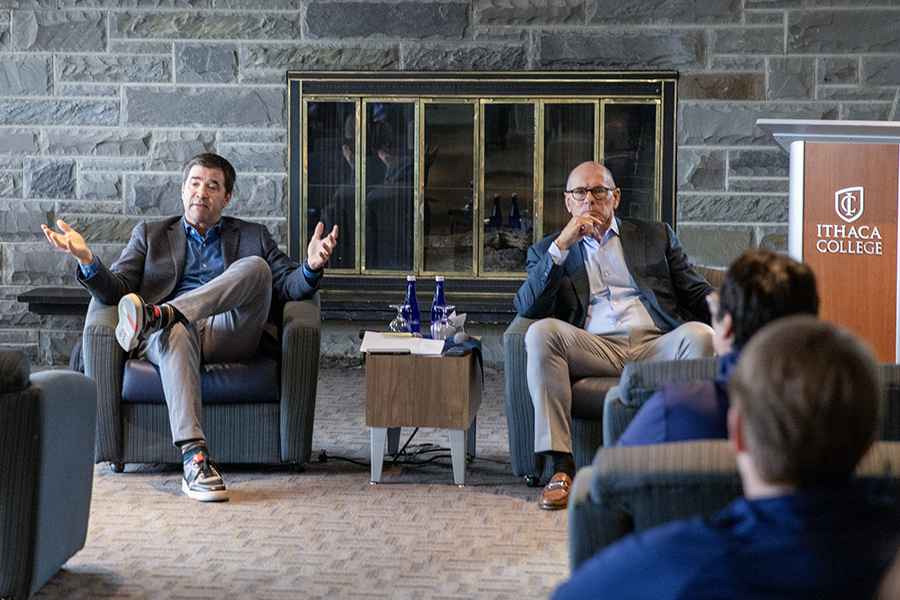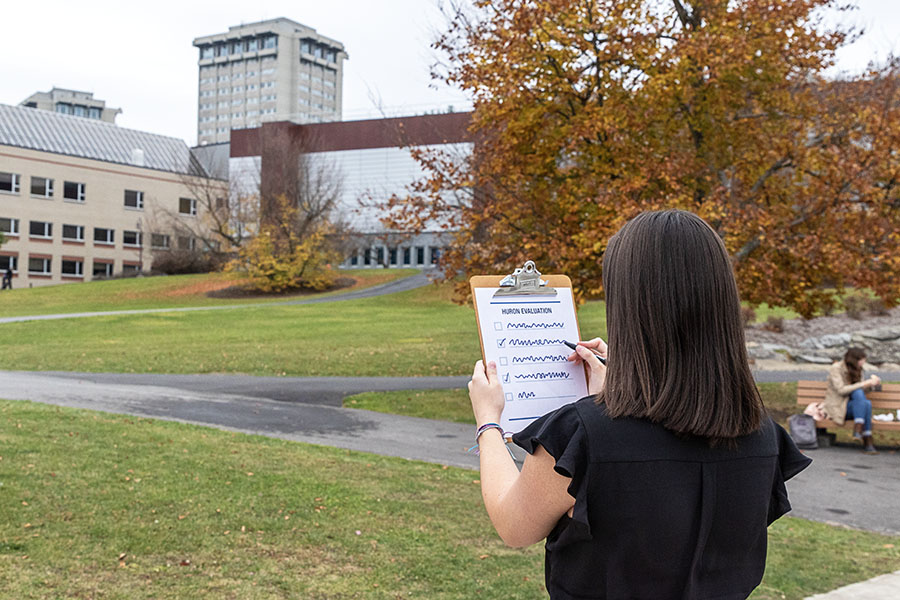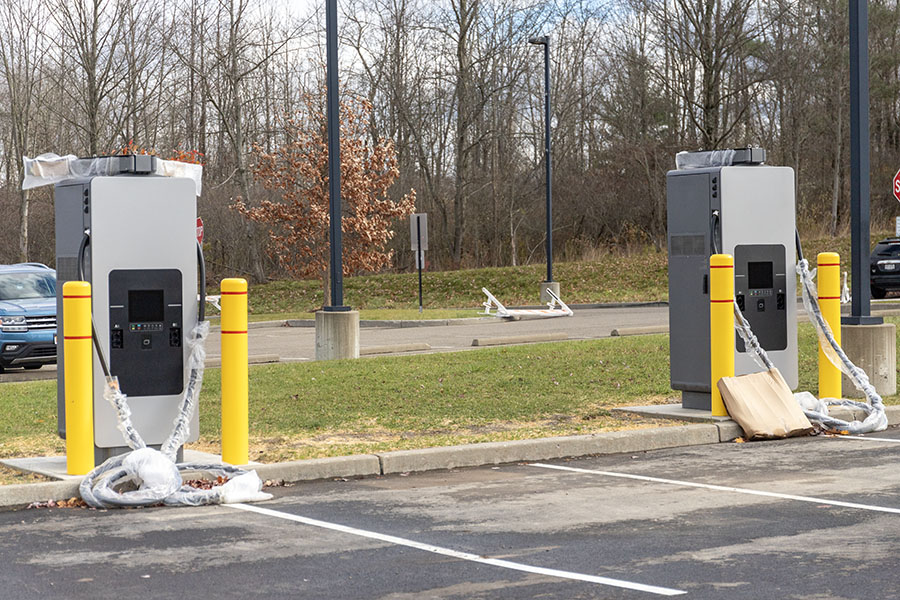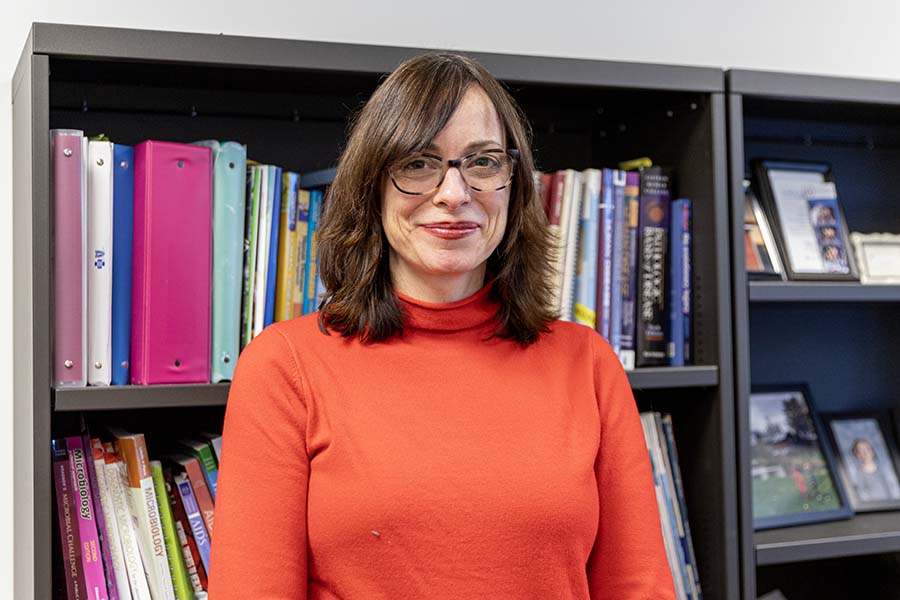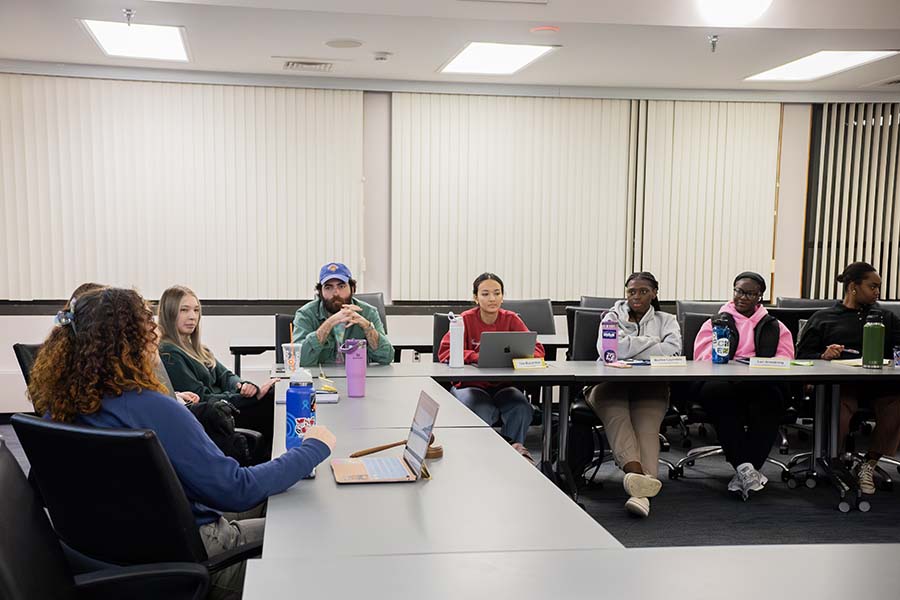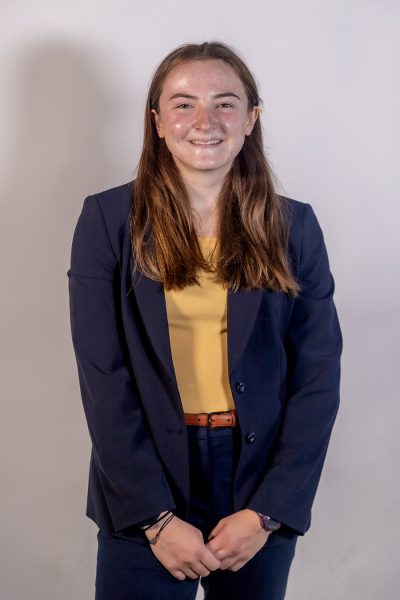The Ithaca College Board of Trustees held an open conversation Oct. 20 to discuss updates from their fall meeting and answer questions from campus community members about financial aid, recruiting new students and the college’s finances.
The board of trustees held its Fall 2023 meetings on campus from Oct. 18 to Oct. 20. David Lissy ’87, chair of the board of trustees, and James Nolan ’77, parent ’01, vice chair of the board of trustees, summarized the board’s meetings and initiatives for about 20 people who attended the open conversation.
Lissy said the board participated in two student immersions, one in the School of Business and one in the School of Health Sciences and Human Performance. He said the board spoke with students about how schools’ restructured curriculum decreases major requirements and opens options for multidisciplinary education.
“[The Office of the Provost is] trying to … break down a lot of the barriers to open up the awesome resources that we have as a college to more students because oftentimes, when you’re a student trying to pursue a major, you get stuck in so many requirements, you can’t delve into all the things this college has to offer,” Lissy said.
Lissy said the board also discussed finance and enrollment; Title IX requirements; and AI’s role in higher education, and how the college is planning to acknowledge and integrate AI technology in academics.
Doreen Hettich-Atkins, executive director of Student Affairs and Campus Life, asked if the college has any plans that reflect developments in the higher education landscape.
Lissy said the college has struggled with decreasing enrollment and is trying to make changes to establish stability and increase enrollment to prosper — instead of survive — in the higher education landscape.
“We exist in the market to try to attract students to come here and choose us over many other options they have,” Lissy said. “From an enrollment trend perspective … we’re a better trajectory coming out of COVID than we did with COVID. … We still have to think about how it is that we can ensure that we have a really solid value proposition and reason for students to come. And that’s a combination of the attractiveness of our programs and how they’re priced.”
Lissy said the college compares student experiences and financial aid from competitive schools, colleges and universities that students choose instead of Ithaca College, and comparative schools — institutions that have a similar size student body as the college.
Nolan said the college is working to improve its value proposition by considering what current high school students are looking for in a college or university.
“Higher ed is no different than business and product in the business world — it has to stay relevant on a constant basis,” Nolan said. “In one of the latest rankings, our value relationship was actually in a better level than it’s been historically, so that’s encouraging.”
Brett Bossard, executive director of Alumni and Family Engagement, asked if the college has considered decreasing the sticker price, the total cost of attending the college.
Lissy said most students do not pay the full cost of attendance because they receive a high discount rate — the amount of merit aid and financial aid that the college gives students that does not have to be repaid. The estimated cost of tuition, housing and meals for 2023–24 is $66,540, but the average cost after aid is $33,748 according to College Scorecard.
Nolan said that decreasing the number students pay through a high discount rate may seem strange, especially with declining enrollment, but it helps attract more students.
“I spent my career in the consumer products world, so … it’s counterintuitive to me that we would be discounting [the cost of attendance] that kind of level,” Nolan said. “As consumers, we are motivated by [when] something is ‘off,’ right? You know, it’s $1 off or it’s $2 off. … We’re dealing with that dynamic of people are motivated by discounts.”
Lissy said that in addition to comparative institutions, the college is trying to compete with state schools, which offer lower prices for in-state students. Lissy said the college is trying to find other financial incentives in addition to the discount rate to appeal to prospective students.
“We experimented a couple of years ago with a four-year price cap,” Lissy said. “We’re still doing that as a way to differentiate ourselves to say, ‘Look … your tuition will go up over your four years, but this is the maximum it’ll go up.’”
Sybil Conrad, director of the Campus Center, said many of the students she works with have expressed that they were drawn to the college because of its high ranking on the Campus Pride Index.
“Many states are going in a very negative direction when it comes to supporting [LGBTQ+] students in their identities,” Conrad said. “I’m wondering if we are doing any particular shift in our recruitment techniques for states that maybe aren’t at such a pinch point for high school seniors, but are creating a more and more negative environment for students who are a part of the LGBTQ community.”
Lissy said the college has historically seen the highest enrollment from Northeastern states but is hoping to increase the number of students from other regions in the future. He said students from this region alone will not be enough to meet the college’s enrollment goals.
For now, Lissy said the college is trying to revive some of the traditional recruiting methods in Northeastern states that faded during the start of the COVID-19 pandemic.
“We spent a lot of time and effort going into high schools meeting with guidance counselors, meeting with high school students on the ground in territories,” Lissy said. “We’ve re-energized that. I think last year we did something like 400 something high school visits. Now we’re going to have over 700 this year and they’re going to be directed towards places … where, historically, we’ve been successful in attracting students.”
Lissy said the college has restarted the search process for the vice president of enrollment and student success. The candidate selected will lead new initiatives to revamp recruiting new students.
Kimberly Leib, business partner in the Office of Human Resources, said the college primarily depends on undergraduate tuition to finance its operations and asked if the college plans to diversify its revenue.
Lissy agreed that the college depends on undergraduate tuition, and said that increasing enrollment has been challenging because many colleges compete for the same undergraduate applicants. Lissy said the college sees promise in its graduate programs.
“Not only do we offer things that naturally extend the undergraduate experience that we have here into a professional or another professional experience, but for the most part, they’re paying us full tuition for graduate programs,” Lissy said. “I don’t think we’ll ever stop being fundamentally first an undergraduate teaching college, but there’s opportunity to do that.”


